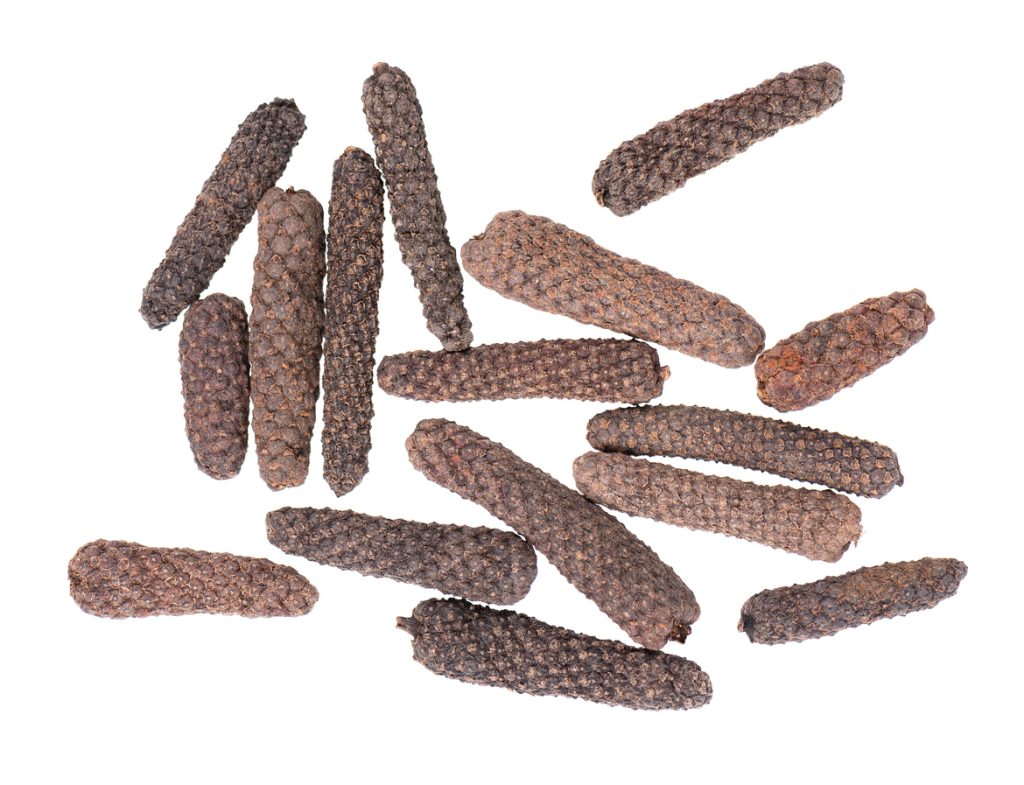Long Pepper

What is Long Pepper?
Long Pepper (bi bo, 荜茇), also known as Fructus Piperis Longi, is the fruit spike of Piper longum L., an evergreen and perennial flowering vine that belongs to the Piperaceae family. Native to South Asia and grown mainly in India, Indonesia and Malaysia, Piper longum is characterised by its long, thin and cone-shaped spikes that are about two to three inches in length.
When these fruit spikes turn from green to black, people then gather them, remove their impurities, and dry them under the sun for medicinal usage. Long Pepper has been used in Ayurvedic medicine for thousands of years, and has appeared in records of Traditional Chinese Medicine since 659 AD. Aside from its medicinal properties, Long Pepper is also used for its flavour as a spice in cooking. It has a pungent, slightly sweet flavour, and is often used in Indian and Southeast Asian cuisines to add flavour to dishes such as curries, pickles and chutneys.
In Traditional Chinese Medicine (TCM), Long Pepper falls under the category of ‘Herbs that warm the interior and expel Cold’. Such herbs are used for internal Cold with Qi Deficiency or Yang Deficiency. Hot in nature, Long Pepper can help individuals with too much Cold in their body, such as those experiencing a Yin Excess or a Yang Deficiency, to restore a harmonious yin-yang balance.
Bitter in taste, Long Pepper can cleanse the body by clearing Heat, drying Dampness and promoting elimination via urination or bowel movements. In particular, Long Pepper targets the large intestine and the stomach.
Functions and Benefits of Long Pepper
Traditional Chinese Medicine (TCM) shows that Long Pepper has the following health benefits.
Long Pepper can warm the stomach and middle energizer, as well as disperse Cold to alleviate abdominal pain. For gastro-abdominal pain due to congealing Cold, Long Pepper can be used alone or combined with other middle-energizer-warming herbs to enhance its effectiveness. Other symptoms that Long Pepper can relieve include nausea, hiccups, belching, acid regurgitation and loss of appetite.
Also, Long Pepper can warm the Spleen and stomach to arrest vomiting and check diarrhea. For vomiting due to stomach Cold, Long Pepper can be ground into powder and added to congee for consumption, or combined with other stomach-warming and vomiting-arresting herbs to enhance its effectiveness. In addition, Long Pepper powder is used to treat toothache topically.
Today, Long Pepper is believed to stimulate digestive enzymes, which can aid digestion and prevent digestive problems such as bloating. Also, Long Pepper is said to have anti-inflammatory properties that can help reduce inflammation in the respiratory system and prevent chronic health conditions, making it potentially helpful for conditions such as asthma, bronchitis, heart disease, cancer and arthritis. Long Pepper has also been shown to have antimicrobial properties, which make it useful for treating bacterial and fungal infections.
Traditionally, Long Pepper has been used to relieve pain, including joint pain and headaches. It is believed to work by reducing inflammation and improving blood flow. The exceptional hypoglycemic property of Long Pepper also makes it a potential herb to aid diabetes management. Touted for its natural fat-burning properties, Long Pepper can detoxify the body and reduce hunger pangs to aid weight management.
Boasted as a natural aphrodisiac, Long Pepper may also help to reduce stress and anxiety, treat erectile dysfunctions, and increase libido in both men and women. Long Pepper may be a useful treatment for heavy menstrual flow and menstrual cramps as well. In addition, Long Pepper may prevent Liver ailments by managing Liver toxicity and preventing jaundice.

How to Use Long Pepper
The recommended daily dosage of Long Pepper is 1.5 – 3g, when consumed as a decoction. For external application, do consult your healthcare provider on the appropriate dosage for your condition.
When consuming Long Pepper, you can consume it with wine or watery gruel, such as congee.
Long Pepper and Long Pepper supplements can be found in many herbal stores and Asian specialty stores.
Cautions and Side Effects of Long Pepper
Long Pepper should not be used by individuals who are experiencing Heat signs, whether due to hyperactivity of fire caused by Yin Deficiency or Excess Heat. Pregnant and breastfeeding women should refrain from using this herb for the time being as well.
We strongly encourage you to consult your healthcare provider before deciding to add Long Pepper to your healthcare routine!
Summary
Here is a summary for Long Pepper:
- Herb name (Chinese): 荜茇
- Herb name (Pin Yin): bì bó
- Herb name (English): Long Pepper
- Herb name (Botanical): Fructus Piperis Longi
- Origin of species: Piper longum L.
- Part(s) of herb used: Fruit
- Geo-specific habitat(s): Guangdong, Yunnan
- Taste(s) & Properties: Pungent; Hot; Administrates the Stomach and Large Intestine Meridians
- Actions: Eases gastrointestinal discomforts, such as stomach ache, nausea or vomiting, diarrhoea, etc
References
Babu, K. N., Divakaran, M., Ravindran, P. N., & Peter, K. V. (2006). Long pepper. In Handbook of herbs and spices (pp. 420-437). Woodhead Publishing. [Accessed on 13th February 2023]
Shankaracharya, N. B., Jaganmohan Rao, L., Pura Naik, J., & Nagalakshmi, S. (1997). Characterisation of chemical constituents of Indian long pepper (Piper longum L.). Journal of Food Science and Technology, 34(1), 73-75. [Accessed on 13th February 2023]
Share this article on
